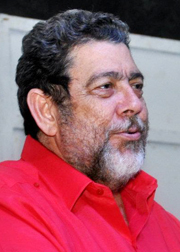
KINGSTOWN, St. Vincent – A release from the International Monetary Fund (IMF) this week may have offered some insights into possible changes to the government’s fiscal policy next year.
The IMF, in a statement after its Article IV consultation here, said its welcomed the Unity Labour Party (ULP) government’s “plans to introduce market-based property taxes, strengthen revenue administration, contain the public sector wage bill, limit transfers to state owned enterprises, and rationalize spending on goods and services”.
This suggests that the government might in fact introduce market-based property taxes, which Prime Minister and Minister of Finance Dr. Ralph Gonsalves spoke of in his Budget Address in January, but said needed proper legislative framework.
Property taxes are currently calculated based on rental value and an economist noted to I-Witness News this month that pension reform and property tax reform were among several changes to which Eastern Caribbean Currency Union (ECCU) government have agreed.
There is a Pensions Reform Committee that reports to the Eastern Caribbean Central Bank (ECCB) Monetary Council and the source explained that the proposed pension reform includes revising the social security parameters regarding maximum contribution and retirement age.
“With respect to the property tax, some member countries have already changed the basis of valuation from rental value to market value. I suspect that St Vincent and the Grenadines is also considering this move,” the economist, who asked for anonymity, said.
“Both issues — pensions reform and tax reform — have been addressed at the regional level. However, the speed of implementation at the national level usually depends on the priorities of the national governments, who retain sovereignty on fiscal policy,” the economist further stated.

And Prime Minister Gonsalves, in his independence speech last month, told citizens that “the revenues of the central government have been falling as a consequence of slow or no economic growth and the limitation in the tax administration”.
He said that the deficit has been increasing and while the economy is expected to grow 0.8 per cent this year — with greater growth expected in 2012, fiscal rebalancing and consolidating would “occur over the medium term”.
Gonsalves told Parliament this week that revenue and grants this year amounted to EC$416.8 million compared to $402.6 in 2010.
However, current revenue, at $377.4 million, was EC$13.9 million less than last year, even as capital revenue and grants had increased from $11.3 million in 2010 to $39.4 million this year.
Total expenditure was $453 million this year, $18.4 million more than last year, while recurrent expenditure has moved to $412.5 million, up from $396.5 million last year.
This year, capital expenditure amounted to $40.5 million, compared to $38.1 million year on year while the current balance this year stood at minus $35.1 million, significantly lower than the minus $5.2 million of 2010.
However, the over-all balance of $36.3 million this year was $2.3 million more than in 2010.
The IMF directors, according to the statement this week, welcome the government’s commitment to prudent macroeconomic policies and encouraged them to press ahead with efforts to enhance the economy’s resilience to shocks and foster sustainable growth.
But while the government recognised the difficult trade-offs with current pro-growth and social spending needs, many IMF directors noted that “a more ambitious consolidation, including pension and civil service reforms, would help to build buffers against potential future shocks”.
The directors further highlighted the need to increase the growth potential and diversify the economy, including by improving the business climate and enhancing competitiveness.
“This would help to reduce the large and unsustainable current account deficit,” they said, even as they welcomed the government’s efforts to ease access to credit and invest in infrastructure and education.
They further noted that technical assistance and donor support would be important to underpin the country’s reform agenda.
Directors underscored the need for close monitoring of both the banking and nonbank financial sectors. They noted that regional financial sector concerns could affect confidence and ultimately impact economic activity.
They supported enhanced monitoring of cross-institution and cross-border holdings, in coordination with regional authorities and also encouraged the authorities to expedite the establishment of the Single Regulatory Unit for the nonbank sector.
The IMF directors further commended the government’s intention to generate primary fiscal surpluses in the range of 2 per cent of GDP by 2016 and to avoid external commercial borrowing to ensure debt sustainability.
Gonsalves will present the budget in December, during which he is expected to outline any fiscal policy changes his government plans to undertake.





